-
About
- About Listly
- Community & Support
- Howto
- Chrome Extension
- Bookmarklet
- WordPress Plugin
- Listly Premium
- Privacy
- Terms
- DMCA Copyright
- © 2010-2025 Boomy Labs
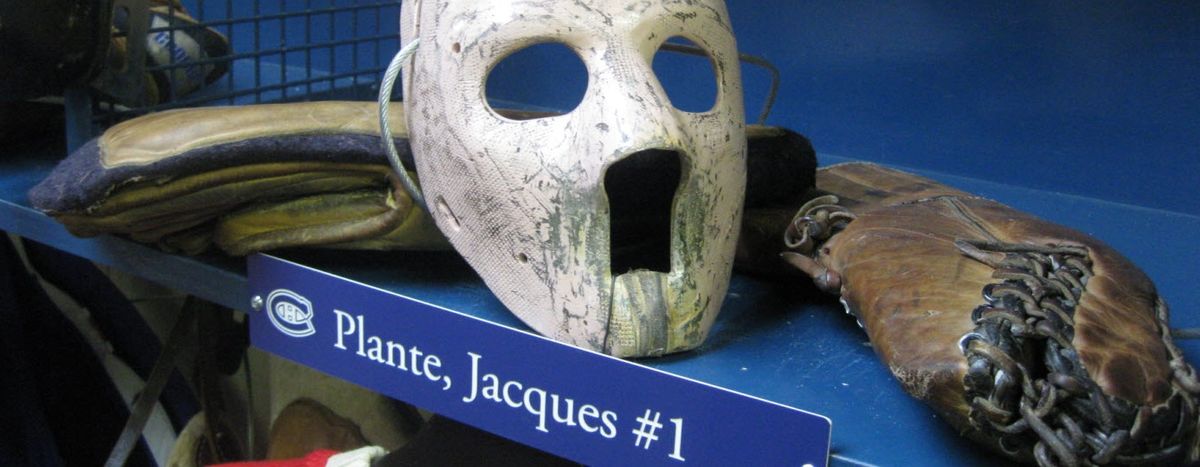

 John Huh
John Huh
Listly by John Huh
Goaltenders are a different breed.
Let’s face it, you’ve got to be different to play the most unique position in all of sports. But as eccentric or as quirky as some goalies may be, they all share a common trait of competitive courage. After all, the very notion of stopping a vulcanized rubber disc traveling at speeds exceeding 100 mph defines the lack of fear.
It is a miracle that no one has ever lost their life playing this position, especially in an age where goalie equipment had the protective properties of soggy cardboard.
The position in and of itself is also unique in that it’s often the wild card to the equation of competition, especially in the playoffs. It can single-handedly decide the outcome of the game for better or worse, against any foe or strategy.
So in ranking these goaltenders, I found that defining greatness in these men was also a very different challenge.
After all, what qualified you to be great? Championships? Statistics? Individual accomplishments?
In a sport with such a long-and-storied history and many different eras of play, it wasn’t easy. Of course, it stands to reason that many will disagree with this list, given the difficulty of evaluating the position.
Whether you agree or disagree with any of the selections, I hope you enjoy reading as much as I’ve enjoyed writing it. If you have any changes or different ideas to where these NHL goalies should rank, let me know!
This article was originally submitted by me to Bleacher Report on May, 6th, 2011.
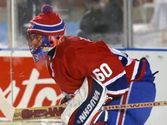
During the writeup of this article, at least 10 different players have occupied the 50th slot at one point or another. Marc-Andre Fleury, Felix Potvin, Dwayne Roloson, Nikolai Khabibulin and even Andy Moog were just a few of the names deserving of mention.
Oddly enough, this slot was the most difficult to nail down on this list, but Jose Theodore deserves this position.
Posting a .931 save percentage in the 2001-2002 season, Theodore backed the Montreal Canadiens to a 36-31-12 record. His brilliant play late in the season powered a Montreal surge that brought the Canadiens back to the playoffs for the first time since 1998.
Theodore edged Patrick Roy for the Vezina and won the Hart, despite St. Patrick’s 1.94 goals-against average and nine shutouts in the regular season.
Winning the Vezina on the strength of first place votes, Theodore joins rare company as a goaltender to have won both the Vezina and Hart trophies in the same year.
His career failed to live up to that standard, however, as injuries and inconsistency have plagued his career post-lockout.
Inside the Numbers: 1 Hart trophy, 1 Vezina trophy, 1 Roger Crozier trophy, 1 Masterton trophy, 2 All-Star games

Cam Ward entered the NHL in 2005, and wasted no time making an immediate impact for his Carolina Hurricanes. Ward was the difference in his second calender year after the Hurricanes were down 2-0 to the Montreal Canadiens in the Eastern Conference quarterfinals.
Behind his stellar play, the Hurricanes turned the tables before moving on to face the New Jersey Devils and Martin Brodeur. Cam Ward carried the Hurricanes to the Stanley Cup finals, becoming the first rookie goaltender to do so since Patrick Roy in 1986.
Winning 15 playoff games as a rookie, Cam Ward also became the first rookie goaltender to win the Conn Smythe Trophy as a rookie since Ron Hextall in 1987.
Although winning the Stanley Cup for the expansion Hurricanes may have been a great beginning for Ward, he’s made the playoffs just once since then.
Inside the Numbers: 1 Stanley Cup, 1 Conn Smythe.
What sets him apart: Cam Ward’s second calender year in the NHL had him joining hockey’s elite, winning the Conn Smythe and Stanley Cup in 2006.

“Cujo” shot out of the gate to career with the St. Louis Blues, and won 100 games in his first 209 appearances, becoming the fastest to do so in club history.
Like many goaltenders in the 90s, Joseph was overlooked in the NHL draft and signed with St. Louis as a free agent. One of the best signings in team history, Joseph gave the Blues championship-caliber goaltending and confidence in net.
Joseph was as big as they got and carried his team on his back to success on multiple occasions early in his career. Cujo led the overmanned Blues to a sweep against the conference-leading Chicago Blackhawks in 1993, and has knocked off the one-seed four times in his career.
Inside the Numbers: 2 All-Star games, 1 King Clancy trophy.
What sets him apart: Cujo was a big-game goaltender who could be the difference for his team on any given night.
His performance for the Edmonton Oilers in Game 7 of the first-round series against the Dallas Stars was superb. His desperation save against Joe Nieuwendyk in overtime was simply magical and allowed the Oilers to win on the following faceoff.

“Beezer” is one of the most technical and positionally sound goaltenders to ever mind the net in the NHL. His career may have fallen short of the ultimate goal, but he was often the best player on ice for his team and never let his teammates down.
The pinnacle of his career was perhaps during the 1995-96 playoffs where he led the Florida Panthers on a Cinderella run all the way to the finals.
In a run earmarked by the fateful Scott Mellanby slapshot that ended a rat’s life in the “vomitory,” Beezer was the difference maker for Florida.
It was a magical run that saw Beezer mow down the Mario Lemieux-Jaromir Jagr led Pittsburgh Penguins in the Eastern finals, and a glut of plastic rat sales.
One Uwe Krupp triple overtime slapshot later, the Colorado Avalanche sent the Panthers home with nothing to be ashamed of, Vanbiesbrouck most of all.
Inside the Numbers: 1 Vezina trophy, 3 NHL All-Star games
What sets him apart: The diminutive Vanbiesbrouck did the unthinkable when he backstopped the three-year-old expansion Panthers to the finals.
With a team comprised of expansion draft castoffs, and AHL call-ups, Beezer beat the Lindros-led Flyers, and the Lemieux-led Penguins before falling to Patrick Roy and the Avalanche in the finals.
Hugh Lehman is another marvelous goaltender who was an innovator for professional hockey everywhere, as he was the first goaltender to leave the crease and play the puck.
Playing for multiple leagues to begin his career, Lehman finally found his home with the Pacific Coast Hockey Association. He joined Vancouver after his brief stint with the New Westminster Royals, in the association’s first year of existence.
An excellent skater and puck-handler, Lehman also won the Stanley Cup in the 1914-15 year for the Vancouver Millionaires, making them the first PCHA team to win it all.
Inside the Numbers: 1 Stanley Cup, 11 All-Star selections.
What sets him apart: One of the many innovators on this list, Lehman added the dangerous element of puck-handling outside of the crease to his team.
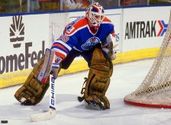
You’d be hard pressed to find a better goaltender in the early 90s than Bill Ranford, whose athletic style and tough mentality entertained fans everywhere.
Filling the rather sizable shoes of Grant Fuhr proved a difficult task, and Gretzky being in L.A. certainly didn’t help matters.
His Conn Smythe-winning year featured some ugly performances to start the playoffs, but Ranford recovered quite nicely en route to beating the Bruins for the Stanley Cup.
Inside the Numbers: 2 Stanley Cups, 1 Conn Smythe trophy, 1 All-Star game.
What sets him apart: Ranford was a competitor who could carry his team on his back, and won Game 1 in a triple-overtime thriller against Boston in the finals.
Normie Smith led the Detroit Red Wings to back-to-back titles in the early 1930s, the first of which was against his former team in the Montreal Maroons just three years after leaving.
During an era in which most goaltenders played a stand-up style of play, Smith was a bit ahead of his time and never afraid to flop around to stop the puck.
Setting two NHL records in the memorable series against the Maroons, Smith recorded 92 saves and shutout Montreal for 176 straight minutes.
Inside the Numbers: 2 Stanley Cups, 1 Vezina trophy.
What sets him apart: The diminutive goaltender checked in at just 5’7″ and 155 lbs, but set a NHL record for playoff-shutout minutes that stood for 76 years.
Ron Hextall is one of the toughest overachieving goalies of all-time, and is a third generation Hextall to play in the NHL. Fiery, competitive and never afraid to get creative with his stick, Hextall backstopped the Flyers to two Stanley Cup finals and led the league in wins in 1986-87.
Always a fan “favorite” when on the road, Hextall often times crossed the line when clearing his crease. His numerous transgressions only belied his competitive nature and will to win, as the Flyers are still looking for their next “Hextall.”
He’s also one of the first goaltenders to score a goal, back when that stat wasn’t something readily recorded.
One of the best goaltenders to ever handle the puck, his ability to be the third defenseman on the ice was a huge factor for the Philadelphia Flyers.
Inside the Numbers: 1 Vezina trophy, 1 Conn Smythe trophy, 1 All-Star game.
What sets him apart: Hextall scored two goals as a netminder and one in the playoffs and, although his emotions got the better of him at times, he was a winner for Philadelphia.
Before Ron Hextall ever swung his goalie stick in defense of his crease, Paddy Moran cleared the ice around his net with authority. In an era that had no defined crease, Moran carved his own—sometimes into his opponents’ legs.
Playing in multiple leagues, Moran delivered back-to-back championships to Quebec, defeating the best the Maritime Professional Hockey League had to offer.
Playing for sub-par teams that could barely finish .500, Moran’s only recorded postseason successes were the two Stanley Cup victories with the Quebec Hockey Club Bulldogs.
Inside the Numbers: 2 Stanley Cups, 2 All-Star selections.
What sets him apart: One of the few players on our list to never play in the NHL, Moran was the best of his era and defined the position of goaltender
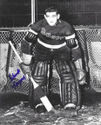
For six years, Rayner roamed the nets for the New York Rangers and won the Hart Memorial trophy in 1950.
He also led his overmatched team to Game 7 of the Stanley Cup finals, but was denied as Pete Babando delivered Detroit a championship in overtime.
Chuck Rayner was one of the best goaltenders of his era, and consistently backstopped some pretty bad teams to success.
Inside the Numbers: 1 Hart trophy, 3 All-Star games.
What sets him apart: Chuck Rayner stole Game 5 and 6 of the Stanley Cup Finals against the powerhouse Detroit Red Wings and their famed “Production Line.”
Against a superior opponent, and forced to play the entire championship round on the road because of the circus taking over Madison Square Garden, Rayner almost delivered hockey’s biggest prize.
In an age where American-born players were few and far between, Mike Karakas was the first U.S.-born goaltender to win it all.
As different as he was, Karakas also relied on his baseball roots with a quick glove hand and unorthodox style.
The Blackhawks struggled through a 14-25-9 campaign in 1937-38 and, behind his stellar goal-tending, won it all the following year. Capturing his only Stanley Cup for the Chicago Blackhawks in 1939, Karakas unfortunately toiled away his career in the minors due to salary disputes.
An unfortunate fate for a special player who carried the dreams and hopes of a bad team to the championship.
Inside the Numbers: 1 Stanley Cup, 1 Calder trophy, 1 All-Star selection.
What sets him apart: Karakas is the trailblazer in net for American-born goaltenders and, to a lesser degree, American players as a collective. He won the Stanley Cup before Frank Brimsek was even in the NHL, and paved the way for U.S. goaltenders for years to come.
Eddie Giacomin is one of the most beloved Rangers of all-time and, for the better part of a decade, backstopped the Rangers to the playoffs.
He led the league in games played and shutouts for four-straight years, from 1967 onward, and led the Rangers to the Stanley Cup Finals in 1971-72. With the circus forcing the Rangers to play the complete finals series on the road, Giacomin came up with one of the most brilliant goaltending performances of all-time.
Giacomin was also as tough as they came, and Giacomin showed it in a playoff game against the Chicago Blackhawks in 1971. Bobby Hull skated over Giacomin’s hand and, with a deeply lacerated stick hand, Giacomin stayed in the game and finished in courageous fashion.
Jean Ratelle and Vic Hadfield could not make the difference for New York as they fell in six games to the Bobby Orr-led Bruins. Orr would win his second Conn Smythe trophy, making him the first player in history to record back-to-back playoff MVPs.
Inside the Numbers: 1 Vezina trophy, 6 All-Star games.
What sets him apart: Giacomin was waived following the 1974 season, and returned to MSG as a Red Wing the following year. The fans at Madison Square Garden responded to their hero, booing their Rangers and chanting Eddie’s name.
The Red Wings won that game in fateful fashion, in no small part to Giacomin’s play in net.
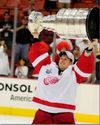
Chris Osgood is one of the most overlooked goaltenders in NHL history, with a record of excellence that his critics consistently ignore. He was named starter for the playoffs in his rookie year, only to commit a horrible turnover that led to Detroit’s ousting against the upstart San Jose Sharks.
One Stanley Cup and a Mike Vernon Conn Smythe later, and Osgood was again the man for the Red Wings in net. After validating the move to ship Vernon to San Jose by sweeping the Washington Capitals to win back-to-back championships, Osgood was put on waivers in 2001.
After a brief stint with the Islanders and Blues, Osgood returned to Detroit and in the 2007–08 season returned to form. Osgood was instrumental in the Red Wings’ march to the Stanley Cup finals, where Osgood won his second championship.
The Red Wings fell in the Stanley Cup finals the following year, denying Osgood’s third championship—but he’s still one of the greatest winners in net of all time.
Inside the Numbers: 4 Stanley Cups, 2 William Jennings trophies, 4 All-Star games.
What sets him apart : Say what you will about Chris Osgood, but he’s always proven his doubters wrong and shown his championship mettle. His return to the Red Wings when Hasek was ahead of him could be one of the greatest goaltender stories of all-time.
The first Conn Smythe winner to win the trophy, despite losing in the finals, Roger Crozier epitomized heart and soul in the nets for the Red Wings early in his career.
In his first full season with Detroit, he became the only player in NHL history not named Terry Sawchuk to win a Calder as well as being voted as an All-Star.
Against the powerhouse Montreal Canadiens team in 1955-56 finals, Crozier and the Red Wings took the first two games before injury sidelined the goaltender in Game 4.
The great Maurice “Rocket” Richard once said that Crozier had the “best reflexes in all of hockey,” high praise coming from the iconic figure. For three years, he was arguably the best goaltender in the business, having won the Hap Holmes, the Calder and Conn Smythe from 1964-1966.
Health problems, and an unfair label of not being able to perform when the lights were brightest, derailed his once-promising career.
Inside the Numbers: 1 Vezina trophy, 1 Calder trophy, 1 Conn Smythe trophy, 1 All-Star game.
What sets him apart: Without his brief retirement following a string of bad games, Crozier could have been one of the greatest of all-time. Instead, his sabbatical from hockey got him an unfair label that couldn’t have been more wrongly applied.
Lorne Chabot was a winner who just couldn’t get any respect in the early days of the NHL, as his career spanned six teams in 11 years. The argument can be made that he’s one of the greatest to never make the Hall of Fame.
Often forgotten, Chabot backstopped the Rangers to the finals against Montreal in the 1927-28 season, but suffered injury during the five-game series.
He was replaced by his 44-year-old coach Lester Patrick, who led the Rangers to the 2-1 overtime victory. Constantly overlooked and sometimes sensationalized for changing his name to draw more Jewish fans, Chabot was one of the most underrated goalies of all time.
Inside the Numbers: 2 Stanley Cups, 1 Vezina trophy.
What sets him apart : After taking a Nels Stewart shot to his eye in the 1927-28 championship, Chabot’s career derailed as he was traded mercilessly from team to team for the next five years.
Finishing with 201 wins, 73 shutouts and a sparkling 1.54 goals-against average, Chabot very well might be the most underrated goalie ever.
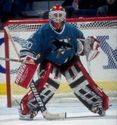
Ed Belfour was one of the most intense and razor-sharp focused goalies in the NHL. He went undrafted despite winning a championship at the college of North Dakota after a tremendous senior season.
He went on to be signed as a free agent by the Chicago Blackhawks. In his rookie season, he won 44 games in 74 starts and recorded four shutouts with a GAA of 2.47. He couldn’t deliver the big prize for Chicago, however, falling just short against the Pittsburgh Penguins in their first Stanley Cup.
Awarded the Calder, Vezina and Jennings trophies in that year, he was also nominated for the Hart as the MVP of the NHL.
An underrated puck-handler and intense goaltender, Belfour didn’t always get along with this teammates but knew how to win.
After a brief stint in San Jose, Belfour found his home with the Dallas Stars and won his only Stanley Cup behind the controversial Hull goal in the finals.
Inside the Numbers: 1 Stanley Cup, 2 Vezina trophy, 4 Jennings trophies 1 Calder trophy, 5 All-Star games.
One of the smallest goaltenders to ever grace the ice in the NHL, Worters could fill the net with his 5’3″ frame and deny the sharpest of shooters.
For the Pittsburgh Pirates, Worters was voted to an unofficial NHL All-Star team selected by coaches in 1927-28. Finishing that year second to Howie Morenz for the Hart trophy, Worters was traded to the Americans the following year where he won the MVP.
Worters posted a 1.15 goals-against average for the Americans in the 1928-29 season, and 13 shutouts as he led the team to the playoffs after finishing dead last the year before.
Inside the Numbers: 1 Vezina trophy, 1 Hart trophy, 2 All-Star nominations.
What sets him apart: Worters won the Hart trophy as the first goaltender to ever do so, during an age where Howie Morenz, Ace Bailey, and Bill Cook dominated scoring.
A pioneer of the game, Percy Lesueur developed the first set of gloves for goaltenders to use in the NHL.
His gauntlet-style gloves helped transform the goaltender position, eventually leading way to the equipment we see today.
Playing 11 pre-NHL seasons, Percy guided Ottawa to two Stanley Cups, in 1909 and 1911, and was traded to Toronto after Clint Benedict’s arrival.
Inside the Numbers : 3 Stanley Cups, 1 All-Star selection.
What sets him apart : Lesueur is one of the true innovators of the game, having designed the nets and gloves for use in the NHL and played in hockey’s very first All-Star game.
Before Bo Jackson put two-sport athletes on the map, John “Bouse” Hutton starred for three different sports for Ottawa.
Posting a 9-1-1 record in Stanley Cup play for the Ottawa Hockey Club, Hutton also won championships playing lacrosse for the Ottawa Capitals and the Ottawa Rough Riders.
Playing at the highest possible levels in all three sports, John Hutton was a true champion.
Inside the Numbers : 2 Stanley Cups.
What sets him apart : John Bower Hutton is the only man to win the Stanley Cup as well as the Canadian football and lacrosse championships.

You can’t evoke the name of Rogie Vachon without thinking Los Angeles Kings, where he spent the majority of his career. Any fan of non-traditional markets should be appreciative of Rogie Vachon’s career, who quietly excelled for the Los Angeles Kings.
In an era where most fans couldn’t get any news of Kings games east of the Rockies, Vachon was the L.A. Kings.
How funny then, that most people don’t even remember his three Stanley Cups with Montreal, where he posted a playoff record of 15-5 and a 1.86 goals-against average.
A true pioneer for West Coast hockey, Vachon was the centerpiece for a 1974-75 Kings team whose 105-point season stood for over a quarter of a century.
Inside the Numbers : 3 Stanley Cups, 1 Vezina trophy, 3 All-Star games.
What sets him apart : Vachon was the NHL’s best-kept secret in the 70s, dominating his position while playing outside the Eastern time zone. Before Gretzky, Vachon was the pioneer for hockey on the left coast.
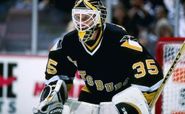
As an 18-year-old kid pulling on a Sabres sweater straight out of high school, no one could have imagined that Tom Barrasso would go on to enjoy a storied NHL career. Winning both Calder and Vezina trophies, Barrasso joined elite company as one of four goaltenders to ever accomplish that feat in a single season.
And for all the offensive firepower the Pittsburgh Penguins exuded, they didn’t win one until they secured the final piece of the championship puzzle in Barrasso.
Barrasso led the NHL in shutouts and goals-against average in 1984-85 and his 14 consecutive Stanley Cup playoff wins might never be toppled.
Inside the Numbers : 2 Stanley Cups, 1 Vezina trophy, 1 Calder trophy, 1 Jennings trophy, 3 All-Star nominations.
What sets him apart : The winningest U.S.-born goaltender of all time, Barrasso won two Stanley Cups but was overshadowed by some of the greatest players in the game.
Rollins is yet another story of individual excellence, leading the league in wins and goals-against in 1950-51 for a last place team.
After six minor league steady seasons, his true mark of excellence came after being picked up by the Toronto Maple Leafs to split duties with Turk Broda.
Rollins was lights out in the finals, posting a 1.55 goals-against and going undefeated in three games. Traded to the Chicago Blackhawks, Rollins won the Hart while posting a 3.23 goals-against average for the last place Blackhawks.
Inside the Numbers : 1 Stanley Cup, 1 Vezina trophy, 1 Hart trophy, 1 All-Star nomination.
What sets him apart : Al Rollins is the only NHL player other than Tommy Anderson to win a Hart trophy for a last place club.
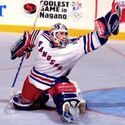
It’s hard to determine where Mike Richter’s greatness truly began, in a career filled with low valleys and struggles. But to bet against the man was just foolish, as he shined on the biggest stage with the brightest of lights.As New York’s leading man in net, the pressure was always on but the gratitude wasn’t always there for Mike Richter.After allowing a soft goal to Ron Francis in the 1991-92 playoffs, Richter lost his starting job and was actually sent down for conditioning.
He would rebound and in 1993-1994 helped the Rangers end their 54-year drought as Richter reached the pinnacle of his NHL career. Coming into the playoffs, Richter and Bure had quite a few moments, but nothing quite like the penalty shot in Game 4.
Richter was an excellent goalie, who could rebound following any tough outing or bad circumstance—something not lost to USA coach Herb Brooks when looking for starters in the 2002 Salt Lake City Olympics.
His remarkable performance backing Team USA in the 1996 World Cup, and his performance in the Olympics following back-to-back knee surgeries, is a testament to Richter’s true ability.
Inside the Numbers : 1 Stanley Cup, 3 All-Star games.
What sets him apart : Mike Richter is a great story of excellence from a long struggle to the pinnacle of his career. His save against Pavel Bure on the penalty shot in Game 7 was one for the ages, and quite possibly the greatest save Richter ever made.
Mike Vernon is the consummate professional both on and off the ice, whose good natured personality belied his intense focus. A focus that would make itself readily available to anyone that dared to question Vernon, who was never one to mince words when pushed.
Carrying the Calgary Flames to their only Stanley Cup championship, Vernon was as “big game” as they got. Vernon thrived when the stakes were highest and didn’t have the word “quit” in his vocabulary.
Amid a season of question marks in the media, Vernon took the Red Wings to a Stanley Cup and won the Conn Smythe trophy a year after being swept by the New Jersey Devils.
Ending Detroit’s 42-year drought, Vernon ushered in a new era of Red Wing hockey, whose dominance arguably extends to this day.
Inside the Numbers : 2 Stanley Cups, 1 Conn Smythe trophy, 1 William Jennings trophy, 5 All-Star games.
What sets him apart : Vernon’s performance in the 1988-89 playoffs in the overtime frame of Game 7 vs. the Vancouver Canucks was one for the legends. Without his performance on three consecutive shots, the Calgary Flames would have been golfing early instead of hoisting the Stanley Cup.
He also led the Calgary Flames to the Stanley Cup over the Montreal Canadiens on Forum ice for the first time in Montreal franchise history.
Harry Lumley is one of the youngest and most superstitious players to ever play in the NHL, and could have been one of the greatest Red Wings of all time.
Instead, he was traded just months after winning the Stanley Cup in the 1949-50 season, and was replaced by Terry Sawchuk.
Posting 33 wins that year, Lumley put down the Rangers in a crucial Game 3 shutout that was played in Toronto due to the circus at MSG.
Inside the Numbers : 1 Stanley Cup, 1 Vezina trophies, 3 All-Star games.
What sets him apart : At 17 years and 38 days, Harry Lumley is the youngest goaltender to ever take NHL ice, and the first teenager to play in a Stanley Cup final.
